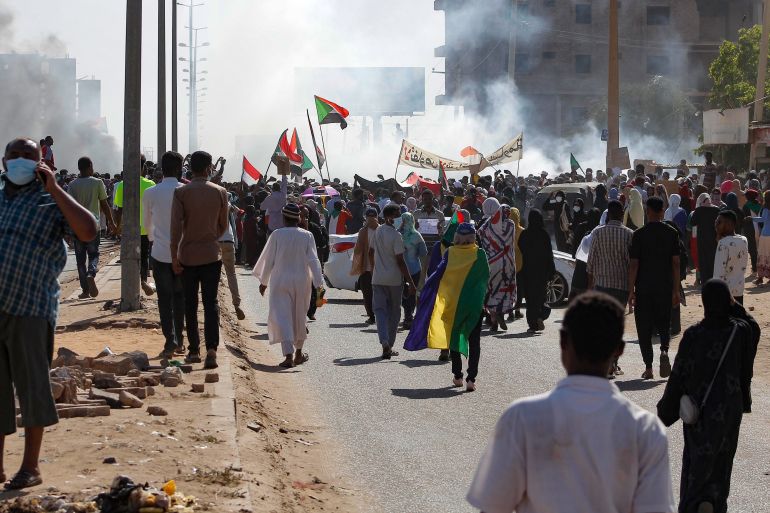Death toll from Sudan anti-coup protests rises, medics say
More than 200 people have been wounded in Sudan’s latest anti-coup protest, including 100 by ‘live bullets’, medics say.

The death toll from Sudan’s latest anti-coup protests at the weekend has risen to eight, medics said, bringing the total number of those killed since last month’s military takeover to at least 23.
Three teenagers were among those who lost their lives during the latest mass protests on Saturday, which were met with the deadliest crackdown since the October 25 coup.
Keep reading
list of 3 itemsSudan army chief names new governing Sovereign Council
Three scenarios for post-coup Sudan
“The confirmed number of martyrs since the coup has so far reached 23 people,” said the Central Committee of Sudanese Doctors, an independent union of medics, on Monday.
The union named all eight protesters killed, including 13-year-old Remaaz Hatim al-Atta, who was shot in the head in front of her family’s home in Khartoum, and Omar Adam who was shot in his neck during protests in the capital city.
“More than 200 wounded have been surveyed so far, including 100 injured with live bullets,” it said, adding that others were wounded with rubber bullets and tear gas in Khartoum and its twin city of Omdurman.
Sudan’s top general Abdel Fattah al-Burhan on October 25 declared a state of emergency, dissolved the government and detained the civilian leadership.
The military takeover sparked a chorus of international condemnation, including punitive aid cuts, with world powers demanding a swift return to civilian rule.
‘Unilateral’ step
Demonstrators have rallied since then despite internet outages and disruptions of communication lines, which forced activists to disseminate calls for protests via graffiti and SMS messages.
State television reported that 39 police personnel were “severely wounded” in confrontations with protesters on Saturday.
The police accused protesters of attacking police stations and vehicles, saying the demonstrations “began peaceful but quickly veered off course”.
They denied using “live rounds”, saying they had used only “minimum force”.
Saturday’s demonstrations came two days after al-Burhan announced a new civilian-military ruling body to replace the one he toppled.
The new council includes figures from the military and from ex-rebel groups from the deposed council.
It also comprised several little-known civilians who replaced members of the Forces for Freedom and Change (FFC), the main civilian body which spearheaded the 2019 protests against then-President Omar al-Bashir.
The FFC has also led calls for a transition to civilian rule.
Meanwhile, cracks started to surface among the pro-democracy movement over a call by a group of political parties and movements to return to the pre-coup power-sharing deal between the protesters and the generals.
The Sudanese Professionals Association, which spearheaded the uprising against al-Bashir, criticised the call, insisting on handing power over to civilians.
The SPA said it would work with the resistance committees and other groups to topple the military council and establish a civilian government to lead the transition to democracy.
The UN has criticised the military’s latest “unilateral” step, while Western countries said it “complicates efforts to put Sudan’s democratic transition back on track”.
Al-Burhan insists the military’s move on October 25 “was not a coup” but a push to “rectify the course of the transition”.